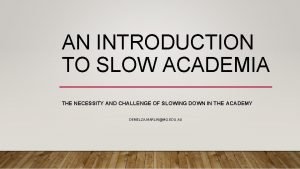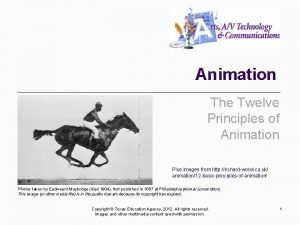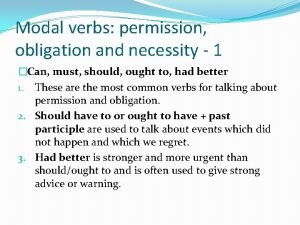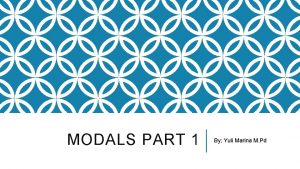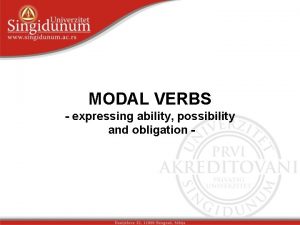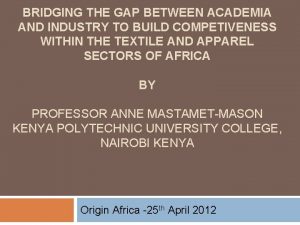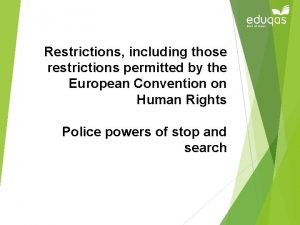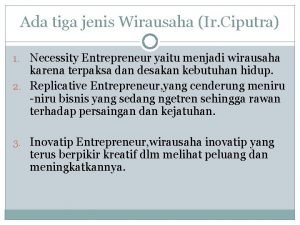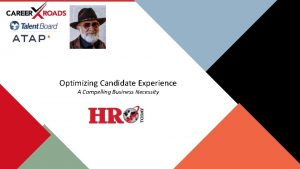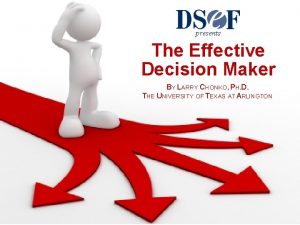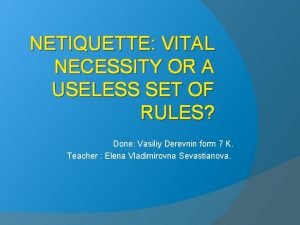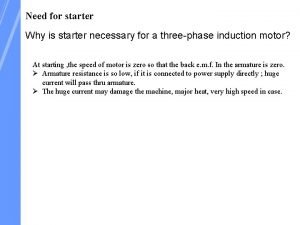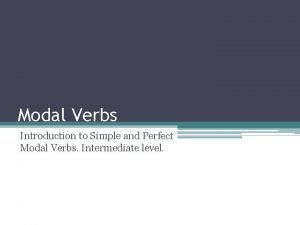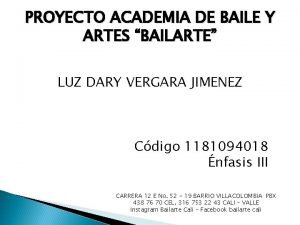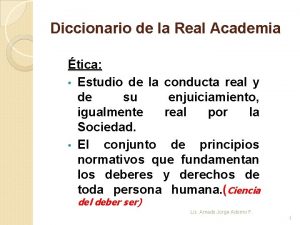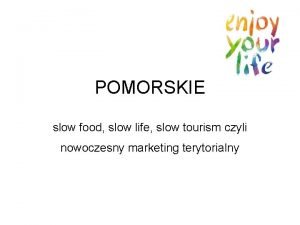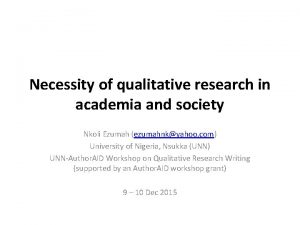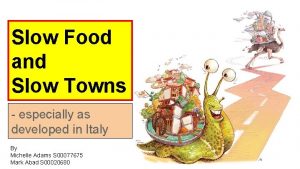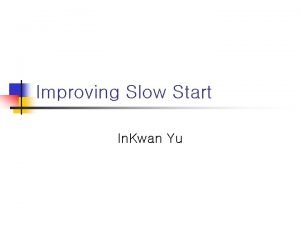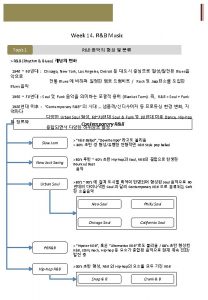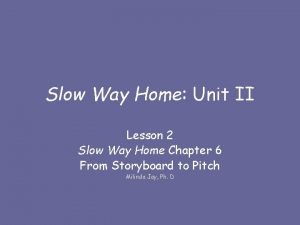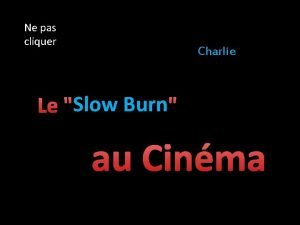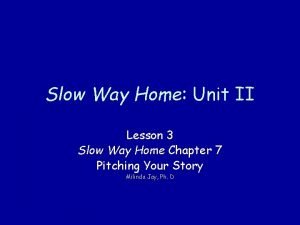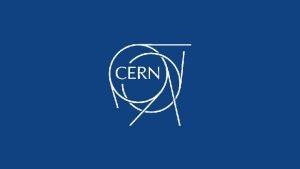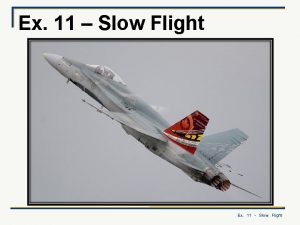AN INTRODUCTION TO SLOW ACADEMIA THE NECESSITY AND

















- Slides: 17

AN INTRODUCTION TO SLOW ACADEMIA THE NECESSITY AND CHALLENGE OF SLOWING DOWN IN THE ACADEMY DEMELZA. MARLIN@MQ. EDU. AU

MEET OUR PANEL • Agnes Bosanquet • Associate Dean, Curriculum Quality Assurance, Fo. HS • https: //theslowacademic. com/2016/11/14/first-blog-post/ • Michelle Jamieson • HDR Learning Advisor Fo. A • https: //myrdc. mq. edu. au/workshop/16441? year=2018 • Andrew Dunstall • Lecturer in Philosophy, Fo. A

WHERE WE MEET We meet on Darug land. This land was never ceded and custodianship of country has been taking place here since the Dreamtime. The Wattamategeal People of the Darug Nation are custodians of this place. We pay respects to Darug Elders past, present and emerging and to Aboriginal and Torres Strait Islander Elders across the continent.

SLOW ACADEMIA – AN INTRODUCTION • In The Slow Professor, Berg and Seeber diagnose a problem in our experience of time and labour in the academy: • Time Sickness – experience of time as finite and constantly running out; never having enough time to complete tasks (also called ‘time poverty’). • This temporal experience arises as a response to demands for higher levels of productivity.

A CULTURE OF SPEED • We see an expression of our culture of speed in the way Ph. D is conceived. • The opened year Ph. D gave way to a 5 year Ph. D, then a 4 Ph. D, and now 3 year degree. • MQ advertises its own program as a 3 year Ph. D – ‘well short of the national average’ • ‘Ph. D Projects’ advertise a program that ensures a Ph. D in 3 months • And we now have the opportunity to describe our thesis in 3 minutes (3 MT)

MANAGING TIME IN THE CORPORATE UNIVERSITY • Anxiety about ‘timely submission’ and numbers of outputs required to get and keep an academic job has given rise to an entire corpus of time-management literature. • Ph. D blogs, time-management books and how-to guides cohere around a few common themes: do more with less time, be smart and strategic in your use of time; prioritise activities that count towards your C. V over those that do not; break down the working day into smaller increments of time (15 min free-writing sessions, 2 hour thesis/research writing sessions, 30 at the desk) to prevent you ‘wasting any’; schedule everything, including breaks.

FRAGMENTATION • Time-management advice for academics borrows from the logic of corporate accounting. It produces efficiency by further fragmenting time (into discrete billable minutes). • While this might produce efficiency (? ) it can also increase our sense anxiety about time and our guilt in the way we use it. • It encourages a utilitarian relationship to both work and leisure. It makes us goaloriented and impatient with aspects of the research process that are slow, that don’t run mechanistically, along linear predictable rhythms, that take time and produce little.

PRODUCTIVISM + CORPORATE METHODS OF TIME-MANAGEMENT = TIME SICKNESS

SLOWNESS AS AN ALTERNATIVE • Slowness offers a critique of the contemporary university and its research culture. It also offers us an alternative model for academia: ‘The problem with time cannot be solved solely with more time … Wishing for more time is a kind of collective fantasy. The way out of time pressure is to challenge the corporate clock by thinking through our perception of time and the expectations of productivity that are driving our sense that we don’t have enough’ (Berg and Seeber, The Slow Professor, p. 55).

The slow movement advocates a shift in our practice and our public discourse, and our relationship to work which ‘gives meaning to thinking about scholarship as community, not competition … to periods of rest, an understanding that research does not run like a mechanism; there are rhythms, which include pauses and periods that may seem unproductive. It allows us to shift from worrying about the annual report to thinking about what is sustainable over the long haul’ (Berg and Seeber, The Slow Professor p. 57).

TIME TO THINK

QUESTIONS TO CONSIDER • Our experience of time within the university and the sense of time needed to support reflective and critical inquiry, and support well-being (scheduled time vs timelessness) • Challenges to adopting slowness and what’s at stake in challenging the dominant research model for tenured staff, ECRs, staff in insecure employment, HDR students. • How we conceive of the slowness movement. Are changes to our own research practice and relationships enough, or does a shift in our research culture require the support of broader institutional change

FIRST QUESTION • Can you tell us about your own interest in, or reservations about slowness. • What does slowness mean for you, in your own working life?

CRITICISMS OF SLOWNESS • Slowness is a luxury for tenured academics; a grotesque example of tenured faculty privilege Poor darlings […] Let’s hope we don’t see the “Slow Nurse”, or “Slow Doctor” movements picking up amongst the professions. Why should academia bathe in this self-indulgence? (https: //thesiswhisperer. com/2018/05/02/slowacademia-is-for-the-privileged-but-then-isnt-all-academia/) • Can we afford to slow down? What is at stake for HDR students, ECRs and academics in insecure employment in pushing back against expectations about productivity?

TIME-MANAGEMENT AND TIMELESSNESS • There is no shortage of time-management advice for HDR students and ECR. Endless blogs, how-to guides and research training resources now exist offer advice about how to ‘manage’ time to meet deadlines. • This advice often uses the logic of accounting and involves breaking the working day down into smaller and smaller increments of time (so we maximise each moment). • This invests our social relationships and leisure time with strategic utility (i. e. turns them into work). Berg and Seeber argue that instead of more time-management, we need more unscheduled time: more ‘timeless time’, where we can become absorbed in a present-moment activity, and lose ourselves in thoughts that do not follow a utilitarian logic (The Slow Professor, p. 25). • What place does unscheduled or timeless time have in your research practice? How important is it to the quality of our thinking, or to our sense of well-being?

WHERE WE DO START? • If we agree that slowness, mindfulness, patience, connection and community are important for reflective inquiry and critical thought; if we agree that they are essential for our well-being, how we begin to make the changes necessary to bring them into our working lives? • Can it be achieved through individual effort (changes to study habits, training about mental health and work-life balance) or does it require broader institutional change (to punitive measures used to encourage ‘timely submission’ of Ph. Ds, for instance)?

FURTHER READING AND REFLECTION • Michelle’s upcoming course: The Mindful Researcher https: //myrdc. mq. edu. au/workshop/16441? year=2018 • Agnes’ blog: The Slow Academic https: //theslowacademic. com/2016/11/14/first-blog-post/ • Maggie Berg and Barbara Seeber (2016) The Slow Professor. Toronto: Toronto University Press. • http: //slow-science. org/ • Any questions or feedback please feel free to get in touch: Demelza. Marlin@mq. edu. au
 Slow academia
Slow academia Copyright
Copyright Modal auxiliary for necessity
Modal auxiliary for necessity Necessity, advisability, and expectations.
Necessity, advisability, and expectations. Ability and obligation
Ability and obligation How to bridge the gap between academia and industry
How to bridge the gap between academia and industry Police necessity
Police necessity What are the necessity of irrigation
What are the necessity of irrigation Necessity of fuse
Necessity of fuse Sebutkan tipe-tipe wirausahawan menurut ir. ciputra
Sebutkan tipe-tipe wirausahawan menurut ir. ciputra French and indian war
French and indian war Business necessity definition
Business necessity definition False necessity trap
False necessity trap Vital necessity
Vital necessity Stator resistance starter
Stator resistance starter Modal verbs introduction
Modal verbs introduction Academia de baile bailarte cali valle del cauca
Academia de baile bailarte cali valle del cauca Dilema etico
Dilema etico
